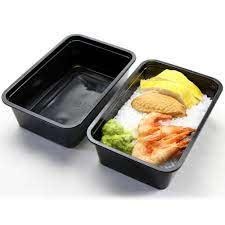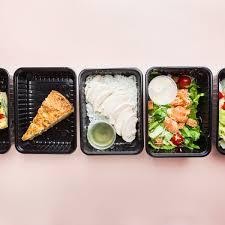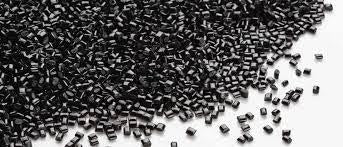Black Plastics Are Bad for Our Planet - but Here's What We Can Do
Recycling Black Plastics
Look around your kitchen, and you’ll likely find something contained within a black plastic container. Microwaveable meals, honey containers, or even mushroom containers are typically housed in black plastic containers that appear to be recyclable and at least relatively eco-friendly. After all, many of today's food products are packaged within these containers. But, are they as reusable or eco-friendly as CleanPacs? Are you conscious of the black plastic recycling challenge? No? Continue reading to learn more!
If you are planning to repurpose these containers as opposed to discarding them, then they can be environmentally friendly. However, even if you choose to recycle these black plastic containers, they may not be as recyclable and sustainable as you might think.

The problem, besides them being single-use plastic in many cases, is that the black plastic is very hard to recycle. Not many local authorities have the necessary equipment for black plastic recycling, so your efforts may end up being for naught. Regrettably, black plastic fast-food packaging all too often ends up in landfills, regardless of being recyclable in theory.
Why does this black plastic packaging material go to waste, and what can we do about it?
Why Can’t Black Plastic From Food Packaging Be Recycled?
You, like most Americans, likely put most of your recyclable packaging into one bin for paper, glass, plastic, and more. At the recycling plant though, all the diverse types and colors of materials must be separated.
Plastics are usually sorted by machines that use near-infrared light to ‘see’ the different colors. Unfortunately, the dye that is used to color black plastic is not seen by those sorting machines. So, although black-plastic recycling is possible, it habitually ends up in the leftover stream of unsorted materials. The next step then is a landfill or incineration - neither of which are environmentally friendly.
For this reason, authorities recommend that black plastics should be added to the list of materials that can’t be recycled by household waste collection.
How Can the Challenge of Black Plastic Recycling Be Solved?

There are changes manufacturers can make to help in handling the issue of black plastic recycling. These involve the use of different materials and dyes, but many experts wonder if these changes are really the answer - perhaps black plastic containers just aren't environmentally friendly after all?
Still, if you must purchase food items packaged in black plastic, reusing them can offer a somewhat environmentally-friendly alternative.
Alternative Black Dyes
It’s possible to apply different dyes to give black plastic its color - dyes that can also be detected by the sorting machines. Furthermore, it is estimated that it could actually cost less than half a penny per tray to switch to these dyes.
However, because these dyes don’t offer as intense of a black color, in addition to the small cost increase, it might take some persuading for food producers to switch to these alternate dyes.
Different Packaging Materials
Another solution could be the use of completely different materials for packaging ready meals and other food products currently using black plastics. For instance, the use of biodegradable material is great for packaging ready meals as it can cope with high oven temperatures. A viable, biodegradable alternative for ready meals has already been developed, but it is a bit more costly and has seen relatively slow adaptation.
It’s still tough to cope with freezers and ovens and can hold fluids without having to be lined with plastic. There are also many other brands working on designing and utilizing compostable packaging.
What Can I Do in the Meantime?
It shouldn’t be challenging to buy convenient food without harming the planet.
Until the food industry gets its act together, here are things you can do to stop the unnecessary waste of black plastic.
Buy Ready Meals That Use Recyclable Packaging
When shopping for ready meals, avoid those with black plastic. But be sure to check whether the alternative packaging is collected for recycling by your local authority.
The more we vote with our cash, the sooner food-producing organizations will be forced to provide alternatives. Nothing makes the decision-makers act quicker than unsold food and wasted profits.
Look For Alternatives To Ready Meals
Making your own meals ahead of time and freezing them in a reusable container is easier and can save money!
Recipe boxes offer just the right amount of ingredients and instructions you need to cook a good meal.
Some services that deliver ready meals will collect the packaging on their next visit or provide free postage for the customer to return the packaging.
Others claim to use recyclable or eco-friendly products.
Experiment with various recipe boxes to see which one suits you best. They may even reignite a love of cooking, which means ready meals in black plastic will be a thing of the past!
Put Pressure On Supermarkets And Manufacturers
Let fast-food producers know that their customers want eco-friendly packaging options. For example, join campaigns to get the food industry to switch to recyclable packaging options.
Other ways can be through petitions directed at individual supermarkets to fix the problem of black plastic recycling. You could also try tweeting to supermarkets asking what they are doing to avoid black plastic.
While black plastic packaging isn’t easy to recycle yet, there are numerous alternatives. You can do your bit by avoiding black plastic where possible.
References and Resources
Eco and Beyond
https://www.ecoandbeyond.co/articles/compostable-biodegradable-packaging/
https://www.ecoandbeyond.co/articles/snact-compostable-food-packaging/
Science Focus
https://www.sciencefocus.com/science/why-is-black-plastic-so-difficult-to-recycle/



